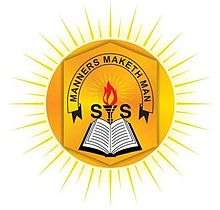St Joseph’s Higher Secondary School, Baramulla
| St. Joseph’s Higher Secondary School | |
|---|---|
 | |
| Address | |
|
Opp. Head Post Office Baramulla, Kashmir J&K, 193101 India | |
| Coordinates | Coordinates: 34°12′13″N 74°21′01″E / 34.203512°N 74.350305°E |
| Information | |
| School type | Missionary Private |
| Motto | Manners Maketh Man |
| Religious affiliation(s) | Catholic Christian |
| Patron saint(s) | St. Joseph |
| Established | 1905 |
| Founded | 1903 |
| Founder | Fr. C. B. Simons MHM |
| Status | Active |
| School board | J & K Board of School Education |
| Administrator | Roman Catholic Diocese of Jammu–Srinagar |
| Principal | Fr. Johnson Mathalikunnel |
| Headmistress | Sr. Sharon CMC |
| Faculty | Local |
| Gender | Co-Educational |
| Number of students | 3500+ |
| Classes | Class Nursery – 12th |
| Language | English |
| Hours in school day | 6Hr |
| Classrooms | 150+ |
| Campus | Urban |
| Houses | Peace, Grace, Joy and Wisdom |
| Colour(s) | Blue, Green, Red, Yellow, Orange |
| Sports | Football, Cricket, Volleyball, Basketball, kho-kho, Badminton, Athletics,hockey |
| Nickname | Josephites |
| Website | http://www.sjskashmir.org |
St. Joseph’s Higher Secondary School Baramulla (commonly referred to as the St. Josephs School Baramulla or SJS) is a private school located in Baramulla, Jammu and Kashmir. The school has been upgraded to the status of a higher secondary school and has also started online education, the first in the Kashmir valley.[1] St. Josephs School is located in the city of Baramulla, Jammu and Kashmir. It has around 3,500 students and over 115 staff members.[2]
History
It was founded by Rev. Fr C. B. Simons of the Mill Hill Missionaries from London in 1903,[3] and established in 1905.[4] St. Joseph's School is one of the oldest missionary schools in Kashmir valley.The school was founded and run by Saint Joseph's Missionary Society of Mill Hill as a Boarding school initially. It was run by Society Of Jesus after Mill Hill Missionaries left the mission.
Alumni
- Maqbool Bhat - Kashmiri Revolutionary Leader, Journalist, author, philosopher, humanist and founder of National Liberation Front( NLF) and then declared leader of Jammu Kashmir Liberation Front (JKLF). He was born on 18 February 1938 to a peasant family in Trehgam village Tehsil Trehgam district Kupwara. His father was called Ghulam Qadar Butt. He studied BA in History and Political Science from University of Kashmir and MA Urdu Literature, Peshawar University, Pakistan.
On 14 September 1966 Maqbool and other JKNLF militants ambushed police. One separatist "Aurangzeb" was killed. Also killed was Amar Chand, an Inspector of the local Crime Branch CID. Maqbool Bhat and Kala Khan were arrested for his murder. Bhat was accused of being the enemy agent and of involvement in the shootout, was found guilty and subsequently sentenced to death. In 1968, Bhat, along with two others, managed to dig a tunnel under the Srinagar prison and escape to Pakistan, where they were briefly arrested. In the years to come Maqbool Bhat became an inspiration for the younger generation in AJK, and he started advocating for the armed struggle branding AJK rulers as puppets of Pakistani rulers and mortgaging the freedom of Kashmir for money and government posts without any power or authority. The PF also swung towards national liberation and Maqbool Bhat was elected its president. This was followed by a Gilgit Baltistan Week in 1970 and Maqbool Bhat along with Khaliq Ansari and Amanulla Khan went to these areas of Kashmir bared for ‘Azad’ Kashmiri politicians but were thrown out by the Pakistani authorities into forests outside of the state boundaries. This reminds one of Robert Thorpe, a Briton born to a Kashmiri mother who was similarly thrown out of the boundaries of Kashmir in 1867 by the then Maharaja of Kashmir Ranbir Singh. However, the campaign for independent Kashmir continued to grow in popularity among Kashmiris in the Pakistani controlled part.
In 1971,Bhat was accused of masterminding the hijacking of an Indian Airlines passenger airline to Lahore, Pakistan, and the hijackers declared affiliation with JKLF under the leadership of Bhat. The Pakistani authorities then arrested Bhat and a number of others. He was released in 1974, and two years later, sneaked into India where he was soon captured.
His earlier death sentence was still valid, and he petitioned to the President of India Giyani Zail Singh for clemency on the grounds of an unfair trial. On 3 February 1984, Ravindra Mhatre an Indian diplomat in the UK, was kidnapped in Birmingham, England, and a demand to release Maqbool Bhat was put forward by the kidnappers. On 6 February 1984, JKLF militants murdered the diplomat in Birmingham. After this, Bhat's petition for clemency was rejected, and Bhat was executed in the Tihar Jail in New Delhi on 11 February 1984 and buried in the jail premises[5]
- Mohammad Najibullah - Afghan President [6][7]
- Syed Altaf Bukhari - Indian Politician[8]
- Nadeem Khateeb - Kashmiri Millitant
References
- ↑ History
- ↑ http://www.sjskashmir.org/staff.php
- ↑ Edward René Hambye (1982). The St. Thomas Christian encyclopaedia of India. St. Thomas Christian Encyclopaedia of India.
- ↑ Overview
- ↑ "Conflict What fuelled Kashmir's Maqbool Butt". Retrieved 16 Sep 2018.
- ↑ "Mohammad Najibullah - President of Afghanistan". www.worldpresidentsdb.com. Retrieved 2017-04-25.
- ↑ Alikuzai, Hamid Wahed (2013-10-11). A Concise History of Afghanistan in 25 Volumes: Volume 1. Trafford Publishing. ISBN 9781490714479.
- ↑ "Sports meet concludes at St Joseph's Baramulla".